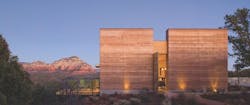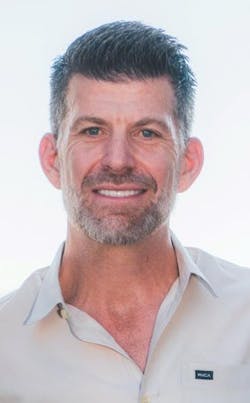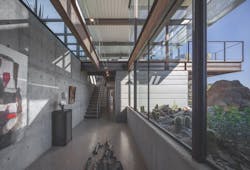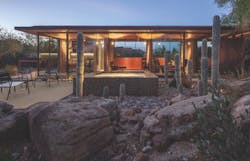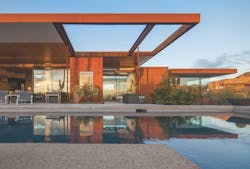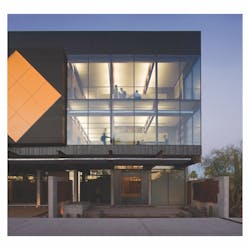Backstory: Just Say Yes
Looking at the way so many of The Construction Zone’s projects seem to grow from the landscape, it’s fitting that the business itself grew “organically,” says founder and president Andy Byrnes. There are enough “legs,” as Byrnes refers to each division—design, construction, glazing, cabinetry, concrete/rammed earth, land development, real estate—to field a bike racing team, which, in fact, the company does have.
Building For Others
Byrnes grew up in Sharon, Mass., and honed his business sense early, doing landscaping and house painting in high school and college. After graduating from Tulane University’s five-year Master of Architecture program in 1992, he packed up a truck and headed west.
“I landed in Phoenix and decided it would be an interesting place to start a company,” he says. Byrnes soon met architects and began his business by “saying yes to small, oddball jobs,” such as building a model for an architect, organizing an office, helping with drawings, and demolishing a homeowner’s patio—“whatever someone would pay me to do,” he says. “I met people and said yes to everything.”
The Construction Zone designed and built this Paradis Valley, Ariz., home, with concrete, stell, and glass done by CZ Work. Because the desert is such a beautiful thing to look at, many of our buildings are primarily glass" Byrnes says. "As long as you protect yourself from the sun, glass is great."
This eventually led to building other people’s designs. “I met the best architects in Phoenix and convinced them I could do their work,” Byrnes says. Currently, about 35% of the jobs his company of 65 employees does involve building other architects’ work, with the other 65% made up of design/build projects.
Those early days, all through the 1990s, were busy. By happenstance, Byrnes met architect Al Beadle, an Arizona desert modernist whose designs include a lot of steel and glass. Byrnes built the last two residences Beadle designed before he died. Byrnes soon met other prominent modern architects, such as Steven Holl, Ted Flato, Eddie Jones, and Tom Kundig. “The types of buildings they were doing in the desert just made sense,” Byrnes says, “and I was privileged to get this education while building for them.”
Soon, when other modern architects were looking for a builder, they would inevitably find The Construction Zone. There weren’t many builders that were willing to take on some of these projects, whether it was because they lacked the labor to tackle complicated jobs or the necessary design chops or Byrnes’ say-yes attitude.
For example, just before the Great Recession, Jones approached Byrnes about building a 32,000-square-foot home with a private art gallery—all in all, a $15 million project—that includes a wall of stacked glass 28 feet tall in places. The wall, which extends up three floors, is “a curving thing” in ¼-inch-thick annealed glass cut into 27 shapes stacked on top of one another. “Nobody wanted to build it or to even engineer it,” Byrnes recalls. “I said I would figure it out.” Two years and 11,000 hours later, the wall was built. “It was definitely an experiment, and we had the owner sign off on the experimental nature of it.”
His Own Team
Tackling such projects is what led Byrnes to keep expanding his business. He couldn’t find subcontractors to do what he needed, so in 1996 he began CZ Work, a subcontracting leg of the company, with crews working in concrete and steel and doing carpentry, trim work, and cabinetry. That led to a glazing company, a millwork company, and a concrete company.
“If you’re doing a $2 million project with a concrete sub who says he can’t get there or he can only give you two guys, that doesn’t work out so well,” Byrnes says. “I started being controlled by the subcontractors, so I built my own team. I got a contracting license for concrete and for rammed-earth construction. This way, we could control the quality, schedule, and budget.”
By 2006, the business grew to 125 staff with a volume of about $27 million, and when the Great Recession drowned a lot of building companies, CZ lost staff by attrition but was able to stay afloat doing out-of-town work. Byrnes’ connections with architects across the nation pulled the company through: “From 2008 through 2015, we were out of Arizona,” he says, “building all the way from the Hamptons to Malibu. We did 25 very large projects all over the country.”
He sent his custom steel and wood trades to these sites when there were no local skilled craftsmen or they were cost-prohibitive. And his in-house glazing division built custom window systems and millwork. Doing this, he says, helped him “figure out how to make our shop nimble. We shipped products from Phoenix to Northern California or Mississippi or South Texas or wherever.”
To find more work, Byrnes partnered with a friend in the food and beverage industry who needed CZ’s help designing and building restaurants. “We’ve since done five restaurants together,” Byrnes says, “and we do restaurants for other people.”
During the lean years, the company was able to fully develop its identity, which Byrnes defines this way: “We build modern architecture without compromise to form or function, while maintaining a commitment to our preconstruction cost estimates and schedule.”
Byrnes also began a real estate division, buying land for development. Recent ventures include the creation of “one or two commercial buildings a year, putting in tenants and collecting rent,” he says. In 2008, long-time employee Michael Groves bought into the business as a partner.
Cycling Around
With all that he has going on, Byrnes isn’t much of a sleeper. He gets three or four hours per night after a hard day at work, but then he’s up and on the road with his wife, Shawna Glazier, and their cycling team at 5 a.m. Glazier competes in Ironman triathlons, and the couple has a friend and client who owns a bike shop, Bicycle Haüs, in Scottsdale. Through him, Byrnes and Glazier met several professional riders who wanted to find a place to ride.
Bringing it all together, Byrnes and Glazier partnered with Scott Bicycles to create CZracing, a team of 35 riders, 11 of whom are paid professionals. The rest, including Byrnes and Glazier, are what Byrnes calls “elite amateurs.” There’s a full-time team manager, and Scott covers about 50% of the costs as the team travels around the U.S. competing.
Byrnes does say he will eventually wind down. There’s no formal plan, but he has nurtured what he describes as an “amazing staff” of superintendents, project managers, and skilled craftsmen who have been with him for decades, and those with more experience train those who have less. Matt Muller, a key employee who began as an intern, became a 10% partner in 2013, and there are a couple of other employees that Byrnes would like to get to that level of ownership and commitment over the next five to 10 years.
With all of the divisions under control, it’s easier for Byrnes to hit the road on his bike. This past summer, he and Glazier took a two-week trip in their custom-outfitted Sprinter van, which included cycling and checking on projects from Arizona to L.A., Palo Alto, Napa, Carson City, and Lake Tahoe; doing a 50-mile mountain bike race; visiting the east side of Yosemite and spending a few nights around June Lake; and heading to Vegas and the Bellagio for some no-limit TexasHold’em. As cyclists say at a tricky section on the trails, “‘You just gotta send it,’” Byrnes says. CB
Stacey Freed covers design and the built world from her home in New York state.
